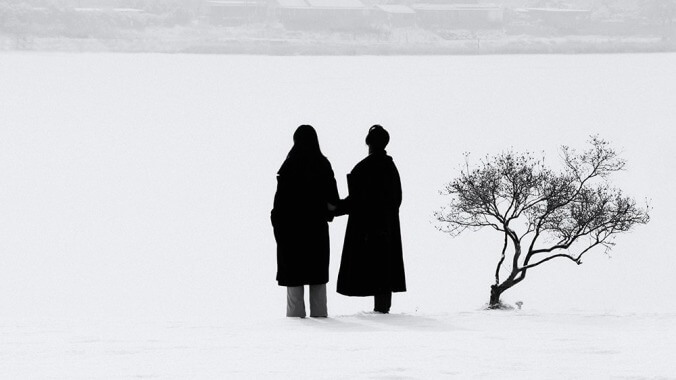The characters of the wildly prolific and consistent South Korean writer-director Hong Sang-soo are awkward guests in lives of missed opportunity and dreamlike repetition, their insensitivities and drifting attentions paralleled by a predisposition to smoke, drink, and overstay one’s welcome. In that sense, Ko Young-hwan (Ki Joo-bong), the central character of Hong’s new film, Hotel By The River, is no different. Older than the average Hong protagonist, but no more mature, Young-hwan is a sixtysomething poet of some renown who has invited his two sons to meet him at an almost empty hotel, where he has been staying as a guest of the owner. Neither of them has seen their father in years; both harbor hard feelings toward him that they can’t articulate or confront. With characteristic subtlety, Hong draws out their mutual fears: that they resemble the old man who abandoned them and their mother, that their own troubles with women are his passed-down curse.
Kyung-soo (Kwon Hae-hyo), the older brother, is a middle-aged divorcé. Byung-soo (Yoo Jun-sang), the younger brother, is a commitment-phobic filmmaker who has recently found some success of his own. Hong has a gift for creating memorable metaphors for the central relationships of his films in their structure. Although Young-hwan makes plans to meet his sons in the hotel restaurant in the opening scene, it takes almost a third of the movie for them to actually find him—only to have him disappear again a few minutes later. Not that he doesn’t have pressing matters to talk about. In fact, Young-hwan is convinced that he is about to die. But a father who can barely keep plans to meet his kids for coffee isn’t about to apologize or make amends. Besides, he seems more concerned with Sang-hee (Kim Min-hee) and Yeon-ju (Song Seon-mi), the two younger women staying down the hall, whom he envisions as angels in the February snow.
But Young-hwan’s talents as a poet (whatever they may be) do not extend to powers of observation. He does not notice the nasty burn on Sang-hee’s hand, and the poem he composes—and, toward the end, drunkenly recites—for the two women has nothing to do with them, and everything to do with his seething frustration about being forced to live on everyone else’s terms, despite ample evidence to the contrary. Nor does he recognize the life metaphor of his own situation—that of a freeloader in a hotel with a view of a river, a manmade impermanence looking out on the eternal, a commingling of social niceties and natural forces. Like so many of Hong’s films, Hotel By The River pokes fun at the foibles of the semi-famous—the painfully uncomfortable interactions with fans, the embarrassment of being recognized or asked for an autograph. (This, it turns out, is hereditary.) But despite its wry tone, the movie offers, in the character of Young-hwan, one of the filmmaker’s more caustic artist stand-ins. The aging sadsack poet can’t see anything outside of himself.
Hong’s films give the impression of being offhand and unassuming, despite their psychological insight and mastery of a certain form—especially since the writer-director started cranking out low-budget dramas faster than most viewers can keep up with them. Hotel By The River is the fifth Hong feature to get an American release in less than three years (in order: Right Now, Wrong Then; On The Beach Alone At Night; Claire’s Camera; The Day After), and much of it should feel extremely familiar to fans: the tables dotted with empty bottles of booze, the icy weather, the filmmaker characters, the minutes-long takes punctuated by tenacious zooms, the refracted autobiographical elements (including, it seems, his widely publicized affair with Kim), and even the cast, most of whom are Hong regulars. Like several of his recent films, it’s in black-and-white, though it breaks his own established tradition by employing a handheld camera that sometimes moves to reveal a previously unacknowledged but essential part of the scene.
But here, one also finds everything that is worth cherishing about this filmmaker’s evolving, self-recycling, self-referential oeuvre: its perspicacious themes of confusion and miscommunication; the conflicts and discomforts expressed in compliments and courtesies; the imperfect, wandering characters who are never completely comfortable around each other or in their own skin. Some of Hong’s finest films (such as Right Now, Wrong Then and The Day He Arrives) have struck an unlikely balance between the quotidian and the surrealistic, bending reality and time around the kind of stories that happen every day—stories of men and women meeting, drinking, and saying the wrong things. But though Hotel By The River has its share of Hong-ian symmetries, doubled characters (the two women, the two brothers), and doubled situations, its dreaminess is more literal. As the characters succumb to drowsiness one by one, nodding off at tables or in hotel beds as a kind of punctuation between scenes, we are reminded that the line between the dream life and the real one can be very fine. We don’t understand either.









































